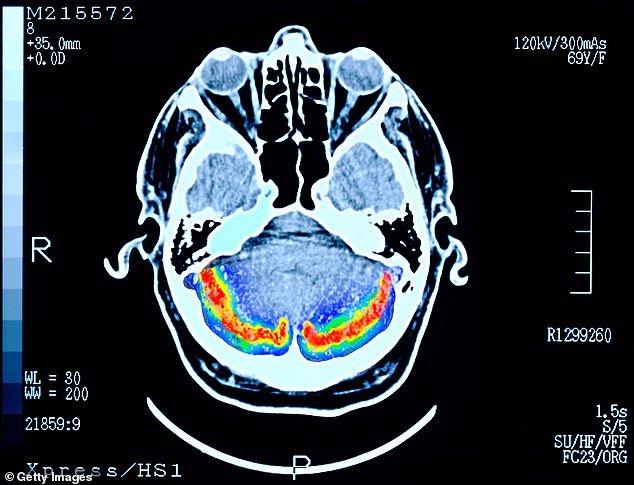Doctors and scientists have made controversial proposals that could see healthy middle-aged adults diagnosed with Alzheimer’s disease — even if they have no symptoms and may never develop the condition.
The plans, which come from an influential panel of the US-based Alzheimer’s Association, include a radical expansion of the definition of the disease to include millions of people who have no cognitive or memory problems.
But people with abnormal levels of a toxic protein called amyloid – which builds up in the brain and has been linked to the development of Alzheimer’s disease – could be told they are in a newly defined ‘phase one’ of the disease, despite being outwardly healthy.
The plans, discussed at an international dementia conference, are partly prompted by the availability of new blood tests that can easily detect high levels of amyloid long before symptoms appear.
Scientists backing the move also point to groundbreaking new drugs such as lecanumab and donanemab – already approved in the US and soon to be greenlit in Britain – which have been shown to clear the brain of amyloid and have a small effect. effect in slowing down the condition.

LIFE CHANGE: A brain scan of a patient with early-stage dementia
In studies, the modest benefits of these treatments were only seen in people with very early-stage Alzheimer’s disease. Scientists claim that, given before symptoms begin, they could be more effective.
One of the panellists, Maria Carrillo, chief science officer at the Alzheimer’s Association, said: ‘The aim of this initiative is to advance the science of early detection and treatment. To prevent dementia, we must detect and treat the disease before symptoms appear.”
But the proposals have sparked a backlash as leading doctors warn of the “very serious” dangers of diagnosing healthy adults with a life-changing disease they may never develop.
Robert Howard, professor of aging psychiatry at the UCL Institute of Mental Health, says there is still much more to understand about the specific role amyloid plays in the development of Alzheimer’s disease. He points to research showing that many older people have significant amyloid buildup in their brains but never show any outward signs of the disease.
‘The majority of people with no evidence of cognitive impairment who are positive on an amyloid test will never develop dementia,’ says Prof Howard. ‘If you tell them they have Alzheimer’s, they will worry for the rest of their lives. Some will make decisions about their lives based on the wrong premise. And the evidence shows that some may become depressed or even commit suicide.”
60,000 people die from dementia in Britain every year, and Alzheimer’s disease is the most common form. Its cause remains unclear, although the main theory is that toxic proteins called amyloid and tau build up and clump in the brain, forming plaques and causing inflammation. Whether the plaques cause the disease or are a symptom of it – or both – remains a matter of debate.
Despite this, the panel proposed revising the diagnosis of Alzheimer’s disease to include six stages of the disease, based on the existence of the plaques and symptoms.
Phase one involves people with no symptoms but high amyloid levels. They would move to stage two if they developed neurological problems such as anxiety or depression, even though these are not necessarily related to dementia.
Phase three is for people with mild cognitive impairment – people who have thinking and memory problems, but who can usually go about their daily lives.
Stages Four, Five and Six of the disease involve mild, moderate or severe dementia.
“There are already doctors in the US who are thinking about Alzheimer’s in this way and offering patients these blood tests in their clinics,” says Prof. Howard, “but I don’t know of any sensible doctor in Britain who thinks it’s a is a good idea. idea. For starters, treatments are extremely limited, even if you have symptoms.
‘At this time, these blood tests should only be available to patients who have been diagnosed with dementia, who have symptoms and want to know what type of dementia they have.’
Doctors in British memory clinics are using amyloid blood tests as an alternative to expensive PET scans and invasive lumbar punctures to help tell the difference between someone with vascular dementia, Alzheimer’s or other forms of the disease.
All patients with Alzheimer’s disease will have abnormal levels of toxic proteins, but there is currently no way to determine which patients with abnormal blood test results and no symptoms may or may not have Alzheimer’s disease.
Lecanumab and donanemab have been shown to clear the brain of toxic plaques in people with Alzheimer’s disease who already have symptoms, but they have also been linked to serious complications, including brain bleeding and swelling.
‘There is an argument that the reason they haven’t worked so well so far is because they haven’t been administered early enough,’ says Prof Howard.
‘Could they work better if given before symptoms start? It’s an interesting question, and part of this push for early diagnosis is because pharmaceutical companies, some scientists and charities are very motivated to test that.
“Some asymptomatic people who test positive on amyloid blood tests in the US are already being recruited for new studies. But you would have to treat thousands of people for twenty years to show whether you can really make a difference.’
Others on the Alzheimer’s Association panel include scientists working with companies developing anti-amyloid drugs. The charity has denied these links influenced its proposals.
However, the skeptics did not say that an approach like this could never work.
“If one day we have an effective treatment that you can continue long before symptoms start, which means you never get dementia again, that would be fantastic,” says Prof. Howard.
“But there’s no indication or suggestion that anything like this is coming anytime soon.”
WHAT IS THE DIFFERENCE… between tonsillitis and strep throat?
Tonsillitis is an infection of the tonsils in the throat. It is most common in children and the main symptoms are sore throat, difficulty swallowing and high fever.
Doctors do not usually provide treatment for tonsillitis because it usually goes away on its own.
Strep throat is an infection of the back of the throat – and sometimes the tonsils – caused by a bacteria called A streptococcus. It is also most commonly found in children, and although its symptoms are similar to tonsillitis, it can cause a red rash, white pus in the throat, and difficulty breathing.
Most strep infections can be treated with antibiotics, but occasionally this can lead to a life-threatening condition called invasive group A strep.
THIS WORKS
Enterosgel Children


A gel that is mixed with water to help combat stomach upset and diarrhea. This new, tasteless version is specially designed for children.
90g for £12.95, enteromed.co.uk
